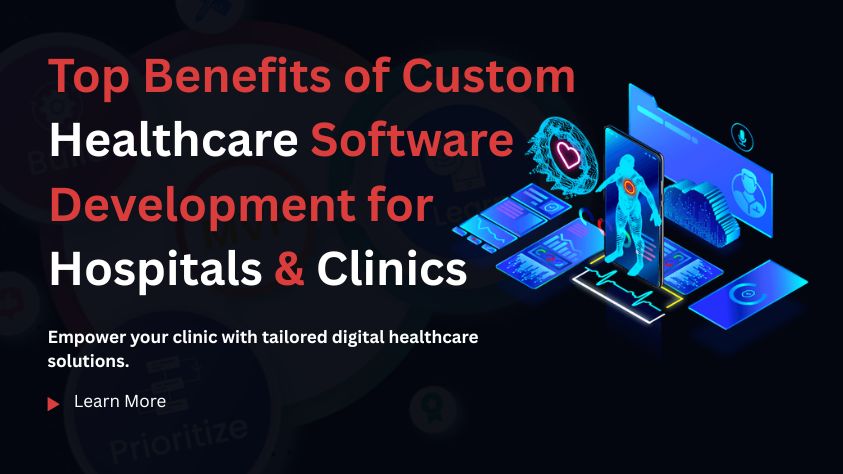Healthcare is rapidly evolving, and technology now plays a key role in improving how hospitals and clinics operate. Many medical facilities are turning to custom healthcare software development to simplify daily tasks, reduce errors, and enhance patient care. In this article, the focus will be on what healthcare software development is, its main types, and the top benefits it brings to hospitals and clinics.
What Is Healthcare Software Development?
Healthcare software development is the process of creating digital tools and programs that help hospitals, clinics, and medical professionals manage their daily tasks more efficiently. These tools can handle everything regarding healthcare IT services from keeping patient records and scheduling appointments to processing bills and tracking treatments.
The main goal of healthcare software development is to make medical services faster, more accurate, and better organized. It helps doctors, nurses, and staff spend less time on paperwork and more time caring for patients. In simple terms, it uses technology to make healthcare smarter and easier for both providers and patients.
Types of Healthcare Software
Different types of healthcare software are designed to meet the unique needs of hospitals and clinics. Through custom healthcare software development, these systems can be tailored to fit daily operations, improve care, and support better decision-making. Modern tools are often built using agile software development in healthcare, allowing faster updates and flexible solutions.
Here are soem of the most commonly used types of healthcare softwares;
-
Medical Billing Software
Medical billing software helps hospitals and clinics manage payments, insurance claims, and patient invoices. With custom healthcare software development, billing systems can be adjusted to fit specific accounting needs and reduce errors.
-
Hospital Management Software
This software keeps hospital operations organized by managing departments, staff schedules, patient admissions, and reports. Using agile software development in healthcare, it can easily adapt to new requirements and improve overall efficiency.
-
Telemedicine Software Development
Telemedicine software allows doctors and patients to connect through secure video calls and chat. It is developed to make healthcare more accessible and convenient, especially for remote areas, using flexible and secure healthcare IT services.
-
Electronic Health Records (EHR) Software
EHR software stores and updates patient medical histories digitally. Through custom healthcare software development, hospitals can design systems that match their record-keeping style and ensure smooth access to information when needed.
-
Clinical Data Management Software
This software collects, organizes, and analyzes medical research or clinical trial data. With the help of custom healthcare software development, it ensures data accuracy, easy reporting, and better research outcomes for healthcare organizations.
Role of Agile Software Development In Healthcare
Healthcare is a field that constantly evolves, and its software systems must evolve with it. Agile software development brings a structured yet flexible approach to this challenge. Rather than following a single, rigid plan, it focuses on collaboration, adaptability, and continuous progress.
The below section uncovers the role of agile software development in healthcare sector;
- Agile software development focuses on creating software in small, manageable stages instead of developing everything at once.
- Developers working with agile methods stay in close communication with healthcare professionals thus, easily identify issues early, reducing the chances of errors.
- In custom healthcare software development, agile methods allow the creation of personalized tools that match each hospital’s unique goals and technical setup.
- Agile methods make it easier to handle changes in healthcare regulations or hospital requirements.
- It encourages regular feedback from doctors, nurses, and administrative staff during the development process ensuring the final product truly fits the hospital’s daily needs and workflows.
Key Things to Looks for In a Healthcare Sftware Company
Choosing the right company for healthcare software is important because it affects how smoothly hospitals and clinics manage their systems. A trusted developer understands the needs of medical professionals and can create reliable medical software solutions or help with healthcare app development that truly improve care and efficiency.
Here are a few key things to look for:
-
Data Security
Strong data security should always come first. A good healthcare software company uses safe coding practices and encryption to protect patient information from any kind of breach. It should also perform regular security checks and updates to ensure that all sensitive data stays protected at all times.
-
Compliance Verification
The company must ensure that every system meets healthcare laws and standards. Proper compliance in medical software solutions helps avoid legal issues and keeps patient data safe and confidential. It is important to verify that the company follows national and international regulations like HIPAA to maintain complete trust and transparency.
-
Patient-centric Design
The best software is easy to use for both doctors and patients. A company skilled in healthcare app development focuses on user-friendly design that supports better communication and a smooth experience for everyone. It should also prioritize accessibility and simplicity, allowing users of all skill levels to navigate the system comfortably.
-
Expertise In Healthcare Technology Solutions
Experience matters. Choose a company that understands how healthcare works and has already built successful medical software solutions. Their expertise ensures the software fits real hospital needs and supports long-term growth. A team with deep healthcare knowledge can also offer ongoing improvements and updates as technology and patient needs evolve.
Integration of Custom Solutions in Existing Hospital Systems
In many hospitals, different departments use separate software for billing, patient records, scheduling, and lab reports. When these systems do not connect properly, it often leads to confusion, data duplication, and time loss. This is where the integration of custom solutions becomes essential.
By linking all tools under one digital framework, hospitals can ensure that information flows smoothly between departments. Integration is a key part of custom healthcare software development, where new applications are designed to work with existing hospital systems instead of replacing them.
This approach allows hospitals to keep their familiar tools while adding new features that improve coordination. Through APIs and smart data connections, information from electronic medical records, billing systems, and diagnostic tools can be accessed from one central platform.
Key Benefits of Custom Healthcare Software Development for Hospitals and Clinics
Modern hospitals and clinics rely on technology to keep their services organized, accurate, and patient-focused. Through custom healthcare software development, every system can be built to match the specific needs of a medical facility. It helps improve workflows, enhance patient experience, and ensure that all departments work together efficiently.
Below are some of the most important benefits of healthcare software development for today’s medical practices;
-
Healthcare Automation Solutions
Automation is one of the biggest advantages of modern healthcare software development. Custom tools can handle repetitive tasks such as scheduling, billing, and report generation, allowing staff to focus more on patient care. These healthcare automation solutions also reduce errors and save time by keeping every process smooth and consistent across departments.
-
Improved Financial Performance
With custom healthcare software development, hospitals and clinics can manage their financial activities more accurately. Automated billing systems and real-time expense tracking help reduce payment delays and prevent costly errors. Integration with EMR software development also allows for smoother insurance claims and faster reimbursements, improving overall cash flow.
-
Better Patient Management System
A strong patient management system is at the heart of efficient healthcare operations. Custom-built platforms can track appointments, store medical histories, and send reminders automatically. Through healthcare software development, hospitals can create systems that connect easily with other tools, ensuring better coordination between doctors, nurses, and administrative staff.
-
Regulatory Compliance
Every healthcare organization must follow strict data protection and safety regulations. Custom healthcare software development ensures that all systems are built in line with local and international standards, including HIPAA. Compliance features built into the software help maintain patient trust and protect the hospital from legal issues.
-
Affordability
Although custom healthcare software development may seem expensive at first, it often proves more cost-effective in the long run. Tailored solutions remove the need for multiple subscriptions or unnecessary features found in generic systems. Hospitals can invest only in what they truly need, lowering long-term maintenance and upgrade costs.
-
Improved Decision-making
Accurate and real-time data plays a major role in better decision-making. With the help of healthcare software development, hospitals can analyze patient outcomes, treatment effectiveness, and financial performance. Data gathered through EMR software development provides valuable insights that support clinical planning and resource management.
-
Effective Communication
Good communication is essential in any healthcare setting. Custom software connects doctors, nurses, and patients through secure messaging systems, alerts, and dashboards. These communication tools developed through healthcare software development reduce misunderstandings, speed up response times, and improve coordination among departments.
Future of in Healthcare Digital Transformation
Digital transformation is no longer limited to record keeping or online consultations, it is shaping how healthcare systems think, plan, and deliver treatment. In the coming years, hospitals and clinics are expected to rely more on data-driven decisions supported by smart technologies such as artificial intelligence, cloud computing, and predictive analytics.
These tools will help medical professionals identify health trends earlier, personalize treatment plans, and improve resource management. Through ongoing custom healthcare software development, systems will become more connected, responsive, and patient-centered.
Digital platforms will also make care more accessible. With advancements in EMR software development and remote monitoring systems, patients will be able to receive quality medical support from virtually anywhere. Automation will continue to simplify administrative work, allowing doctors and nurses to dedicate more time to patient care.
The Bottom Line
The healthcare industry is moving toward a future where technology and patient care go hand in hand. Hospitals and clinics can no longer depend on outdated or disconnected systems when patient expectations and medical challenges keep evolving. This is where partnering with a reliable software development agency makes a real difference. A professional agency understands how healthcare truly works, from managing patient data to ensuring compliance and improving communication between departments. With the right team, healthcare providers can build digital systems that not only fit their current needs but also grow with them in the future. Custom healthcare software is not just a modern trend; it is becoming a necessity for hospitals and clinics aiming for efficiency, accuracy, and patient satisfaction.
Frequently Asked Questions
What is the most used software in healthcare?
The most used software in healthcare is Electronic Health Records (EHR) software. It helps doctors and hospitals store, manage, and access patient information quickly and safely.
How is custom software different from ready-made healthcare software?
Custom software is designed specifically for one hospital or clinic’s needs, while ready-made software comes with fixed features for general use. Custom options fit better with existing systems and workflows.
What is HIPAA compliant software development?
HIPAA compliant software development means creating healthcare software that protects patient data. It follows strict rules to keep all health information private and secure from unauthorized access.
Can small clinics also benefit from custom healthcare software?
Yes, small clinics can benefit greatly. Custom software helps them manage patient records, billing, and appointments more easily, saving both time and effort.
How long does it take to develop custom healthcare software?
The time depends on the features and complexity, but most projects take a few months. Simpler software can be ready faster, while larger systems need more time for testing and setup.




